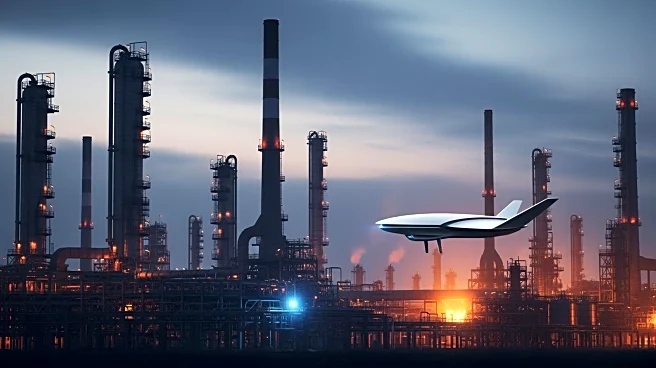What's Happening?
Ukraine has increased its drone strikes on Russian oil refineries, targeting the Ilsk and Ryazan facilities in consecutive nights. These strikes are part of a broader campaign aimed at disrupting the fuel
supply that supports Moscow's military operations and its economic exports. The Ilsk refinery, located in Krasnodar Krai, processes over 6 million tonnes of crude annually, while the Ryazan facility handled about 13 million tonnes last year, making them significant targets. The Ukrainian strategy involves sustained pressure on approximately 40 refineries across Russia, with nearly two dozen experiencing varying levels of damage. This campaign has led to fuel shortages in some Russian regions and increased transport costs as supplies are rerouted to less affected plants.
Why It's Important?
The ongoing strikes by Ukraine on Russian refineries are strategically significant as they aim to weaken Russia's military capabilities by disrupting its fuel supply chain. This tactic not only impacts the operational capacity of Russian forces but also affects the country's economic stability by targeting its export revenues. The reduction in oil output has already led to regional fuel shortages and increased logistical costs, which could further strain Russia's economy. By eroding the Kremlin's ability to sustain its military campaign, Ukraine hopes to create conditions more favorable for diplomatic resolutions. The strikes also force Moscow to divert resources to defend its infrastructure, potentially reducing its offensive capabilities.
What's Next?
Ukraine is likely to continue its campaign of targeting Russian refineries, maintaining pressure on Moscow's military and economic resources. This could lead to further disruptions in Russia's fuel supply and increased economic strain. The Kremlin may respond by enhancing its defensive measures around key infrastructure, potentially reallocating military resources to protect these sites. Additionally, the international community may observe these developments closely, considering their implications for regional stability and potential diplomatic negotiations. The ongoing conflict and economic impacts could influence future geopolitical dynamics in the region.
Beyond the Headlines
The strikes on Russian refineries by Ukraine highlight the evolving nature of modern warfare, where economic targets are increasingly used to exert pressure on adversaries. This approach raises ethical questions about the impact on civilian populations who may suffer from fuel shortages and increased costs. The long-term implications could include shifts in global energy markets, as countries reassess their reliance on Russian oil and seek alternative sources. The situation also underscores the importance of cybersecurity and infrastructure protection in contemporary conflicts, as nations develop strategies to safeguard their critical assets.











